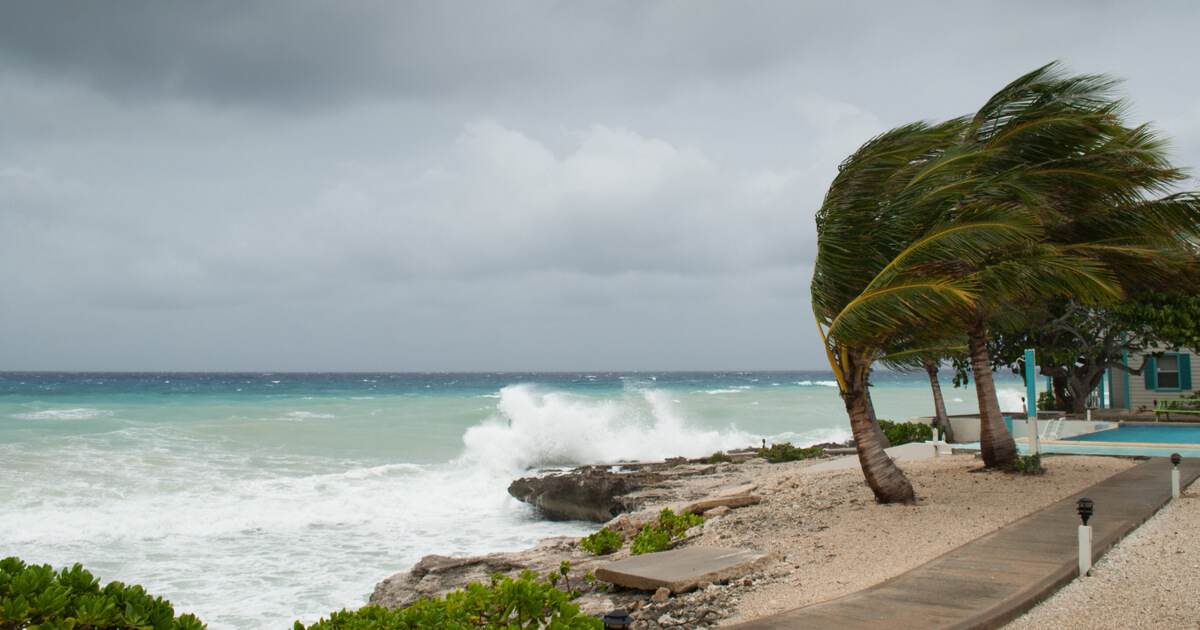
Every year from around June through November, hurricane season arrives in the eastern United States. Some years, it’s quiet and in others it is very active, but residents along the Atlantic and Gulf coasts know that even relatively quiet years can see powerful storms that can cause significant hurricane damage.
Coastal development has increased over the years, but those gorgeous ocean views come with a potential hazard. Hurricanes and tropical storms can do considerable property damage. Your standard insurance policy most likely won’t cover flood or wind damage that results from a hurricane. Your policy may have a hurricane deductible.
This blog digs into what a hurricane deductible is and how you can make sure you’re protected for these hazardous storms.
To compare quotes from many different insurance companies please enter your ZIP code.
Save Money by Comparing Insurance Quotes
Compare Free Insurance Quotes Instantly
Secured with SHA-256 Encryption
What is a deductible?
Most insurance policyholders have heard the term “deductible” before. An insurance deductible is the amount you, as the insured party, are responsible for paying before your insurance policy kicks in.
When you establish an insurance policy with a company, you will generally be asked to choose the level you’d like to set your deductible. Lower deductibles are easier to meet, but typically come with a higher premium cost. Higher deductibles will have a lower premium cost, but it means you’ll need to pay more out of pocket first, before your insurance company will pay on a claim.
Homeowners insurance and renters insurance usually have a set deductible. A homeowner insurance deductible of $1,000 means that the homeowner is responsible for paying the first $1,000 of damage for a covered claim, and the insurance policy covers the rest. If you have a kitchen fire that causes $10,000 in damage and have a $1,000 deductible, you pay the first $1,000 and your homeowners insurance policy covers the remaining $9,000 in damage.
What is a hurricane deductible?
Hurricane deductibles are a relatively new insurance tool and are different from standard property insurance in a couple of ways.
First, and rather obviously, hurricane deductibles apply to damage caused by hurricanes. If you live in a coastal state (especially Alabama, Florida, Georgia, Louisiana, North Carolina, South Carolina, and Texas), check your insurance policy to see if you have hurricane insurance. Then closely review the coverage details. Your policy should clearly spell out what the “event trigger” is, meaning, your insurance company will describe the exact circumstances under which a hurricane deductible will be used.
Although the details will vary from insurer to insurer and from state to state, in most cases it will be when the National Weather Service upgrades a storm from tropical storm to hurricane, when a hurricane hits a certain level of intensity, and/or when a hurricane watch or warning is issued.
In examining your policy, you will probably notice the second major difference of hurricane deductibles versus standard deductibles. Instead of a set, flat dollar amount, your hurricane deductible is a percentage of your home’s value.
How much is hurricane insurance?
Your homeowners policy likely covers some damage from windstorms and hail, but virtually no basic homeowners insurance policies cover flood damage. Flood insurance can be purchased as a separate policy, either through an insurance company that offers it as a separate coverage or directly through the National Flood Insurance Program.
The two biggest categories of damage from hurricanes are wind damage and flooding damage. Hurricane insurance is a type of homeowners insurance that covers damage from hurricane winds and rain. However, when buying such coverage it's important to check exclusions and limitations where you may not be covered. In many cases, homeowners policies do not cover hurricane damage, so you might need to review your policy with an insurance agent to check if you're covered. Even though some policies do include hurricanes, you should not assume that your insurance includes hurricane coverage by default.
With more people living in high-risk coastal areas and stronger and more frequent hurricanes, insurers were facing mounting losses, and homeowners were being met with alarmingly high home insurance premiums.
Hurricane coverage was devised as a way to address the problem of mounting losses and increasingly unaffordable homeowner insurance rates. Imposing a separate hurricane deductible allows insurers to more accurately assess hurricane risk. By separating out the damage to homes caused by a windstorm or hail storm, which is unlikely to be catastrophic, and damage to homes caused by a named hurricane, which can be catastrophic, insurers are better able to provide affordable homeowners insurance rates.
Hurricane insurance is expensive. Hurricane insurance costs vary widely by home value, location, risk of claim, and other factors. For homes at high-risk, you may see higher costs.
If you live in one of the coastal states that allows insurers to charge separate hurricane deductibles, take a close look at your policy to find the percentage. In some of the most hurricane-prone areas, a deductible of 5% of your home’s insured value is not uncommon.
This deductible percentage can actually range from 1% to 5% of your home’s insured value (and up to 10 % in Florida). So, if your home is insured for $250,000 and your hurricane deductible is set at 2%, the deductible you will pay out of pocket for hurricane wind damage before your insurance kicks in is $5,000.
Florida and Hurricanes
If you live in Florida, you are probably well aware of the costs associated with hurricanes, and how hurricane insurance works. Florida has experienced more hurricanes than any other state.
Florida is a peninsula, with ocean waters in the Atlantic and Gulf that warm in the summer making it highly susceptible to hurricanes. The threat of hurricane damage to homes is so high in Florida that after one of the most devastating hurricanes in history, Hurricane Andrew, losses were so great that eight companies became insolvent.
Hurricane risks and losses in Florida are so high that Florida insurers can offer hurricane deductibles as high as 10 % — and even higher in some cases.
That means that for a hurricane deductible, Florida homeowners could have to pay up to 10 % of their home’s value out of pocket for damage to homes before their insurance policy pays on a claim. For a home valued at $250,000, that means a $25,000 deductible.
If you live in Florida or one of the other coastal states in which hurricane deductibles are now being applied, it’s important that you read and understand what is in your homeowners policy.
At minimum, you should:
- Have a hurricane plan, and consider the circumstances under which you could return home in the event of a hurricane.
- Know what your hurricane deductible is, and how you would cover it if you needed to.
- Understand what the triggering event is that is spelled out in your policy.
- Recognize the differences in your coverage for wind damage vs. hurricane damage.
- Get additional flood insurance coverage if you think you’ll need it.
Make sure you prepare for the season before it arrives. Flood and hurricane protection is important to consider. While flooding can happen anywhere, you should especially consider it if you live in one of the states that experiences the most hurricanes. You may even be required to have flood insurance policy, depending on where you live.
According to Clovered.com, here is a ranking of the states that experience the most hurricanes, along with the total number of hurricanes that have hit the state prior to the 2019 hurricane season.
- Florida: 120 hurricanes
- Texas: 64 hurricanes
- North Carolina: 55 hurricanes
- Louisiana: 54 hurricanes
- South Carolina: 30 hurricanes
- Alabama: 24 hurricanes
- Georgia: 22 hurricanes
- Mississippi: 19 hurricanes
- New York: 15 hurricanes
- Massachusetts: 12 hurricanes
When shopping for homeowners coverage, it’s important to find a company that you can trust to be there for you if you experience damage. Be sure to visit Clearsurance’s home insurance rankings page to shop for the companies customers say are the best in your area. You can learn from the experiences of other homeowners.
Save Money by Comparing Insurance Quotes
Compare Free Insurance Quotes Instantly
Secured with SHA-256 Encryption
The content on this site is offered only as a public service to the web community and does not constitute solicitation or provision of legal advice. This site should not be used as a substitute for obtaining legal advice from an insurance company or an attorney licensed or authorized to practice in your jurisdiction. You should always consult a suitably qualified attorney regarding any specific legal problem or matter. The comments and opinions expressed on this site are of the individual author and may not reflect the opinions of the insurance company or any individual attorney.







